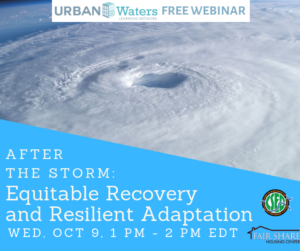This webinar is part of a series hosted by the Urban Waters Learning Network. This year, we are focusing on providing support to urban waters practitioners to help them build community and climate resilience through education, mitigation, and planning. We will be addressing this topic in the coming months through this webinar series (see the first webinar on climate resilience here and register for the second here), blog posts, Impact Stories, and other resources.
How do you build resilience after disaster strikes, knowing that the area is prone to the continued effects of climate change and subject to displacement pressures? What are the barriers to rebuilding and what are some successful ways to adapt? The third webinar in our Urban Waters Learning Network series on climate and community resilience aims to answer these questions. This session focuses on two organizations that work to build resilience as part of recovery and adaptation, while also facing displacement pressures and inequities.
In the webinar, we hear from Arthur Johnson, Executive Director for the the Lower 9th Ward Center for Sustainable Engagement and Development (CSED) in New Orleans and Yvette Chen, Planning and Policy Analyst from the Fair Share Housing Center (FSHC) in New Jersey. Johnson shares how, fourteen years after Katrina, building resilience looks different today than it did early on. Beyond immediate recovery, CSED works to adapt to the effects of climate change through coastal rehabilitation, greening the built environment, increasing food security, and rebuilding homes to be energy efficient, safe and sustainable. Chen shares housing studies and data that examines post-disaster investments that help FHSC to work on their main goal of ensuring that recovery is both equitable and resilient by prioritizing low-income renters and homeowners.

